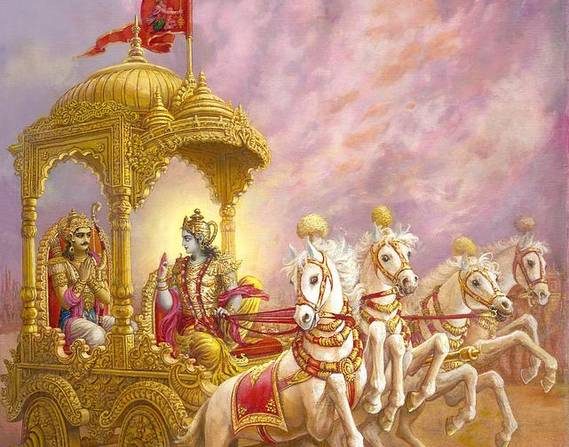CHAPTER 2 SANKHYA YOGA
i. Bhagawan Krishna first wanted to educate Arjuna through harsh words, “What happened to
you, Arjuna? How did you get this wrong thinking in a wrong place in a wrong time? If you
do not start the war but leave the battle-field, people would talk ill of you; they would say
that you ran away from war out of fear. The good name as an expert archer and a great
warrior which you have earned all these years would be totally damaged.
ii. Even these words did not have the desired effect on Arjuna regarding his starting the fight.
Then Lord went on to the other topic of the difference between atma and body.
iii. We are actually atma, not body as we all believe. The body is temporary and destroyable.
Atma is permanent and cannot be destroyed by anyone, by any means. So, it is useless to
feel for death of the body.
iv. What we said above is from the point of view of Gnyana yoga. Even if you look through
Karma yoga angle, we must do our duty properly. A warrior’s duty is to fight for protecting
the right people. Whoever does his duty correctly and dedicates the results or the fruit to
Me totally, will neither have attachment nor any bad reactions (paap).
v. Do your fight with equanimity or a balanced mind and you will go up in life. That is also the
route chosen by a person with a steady mind who is known as, ‘sthitha pragnyan’.
vi. Arjuna was eager to know as to how to identify such a ‘sthitha pragnyan’.
vii. Lord Krishna pointed out to four qualities of such a person. First of all, he will leave out
mental desires and is always happy enjoying with his atma alone.
viii. Secondly, he is away from the grip of anger, desire and fear and is equal in happiness and
distress.
ix. Thirdly, since his mind is in a steady position, he does not seek good, beneficial things nor
avoids bad, harmful things. He doesn’t have attachment to anything and meets good and
bad events happening in his life with a truly balanced view.
x. Fourthly, just to be safeguarding his feelings from the things that tempt him, he withdraws
himself from them like a tortoise draws its limbs inside its body.
Bg. 2.15
यं हि न व्यथयन्त्येते पुरुषं पुरुषर्षभ ।
समदुःखसुखं धीरं सोऽमृतत्वाय कल्पते ॥ १५ ॥
yaṁ hi na vyathayanty ete
puruṣaṁ puruṣarṣabha
sama-duḥkha-sukhaṁ dhīraṁ
so ’mṛtatvāya kalpate
O best among men [Arjuna], the person who is not disturbed by happiness and distress and is steady in both is certainly eligible for liberation.
